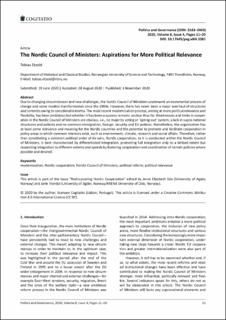| dc.description.abstract | Due to changing circumstances and new challenges, the Nordic Council of Ministers underwent an incremental process of change and some modest transformation since the 1990s. However, there has never been a major overhaul of structures and contents owing to considerable inertia. The most recent modernisation process, aiming at more political relevance and flexibility, has been ambitious but whether it has been a success remains unclear thus far. Weaknesses and limits in cooperation in the Nordic Council of Ministers are obvious, i.e., no majority voting or ‘opting-out’ system, a lack in supra-national structures and policies and no common immigration, foreign, security and EU policies. Nonetheless, the organisation has at least some relevance and meaning for the Nordic countries and the potential to promote and facilitate cooperation in policy areas in which common interests exist, such as environment, climate, research and social affairs. Therefore, rather than constituting a common political order of its own, Nordic cooperation, as it is conducted within the Nordic Council of Ministers, is best characterized by differentiated integration, promoting full integration only to a limited extent but respecting integration to different extents and speeds by fostering cooperation and coordination of certain policies where possible and desired. | en_US |

